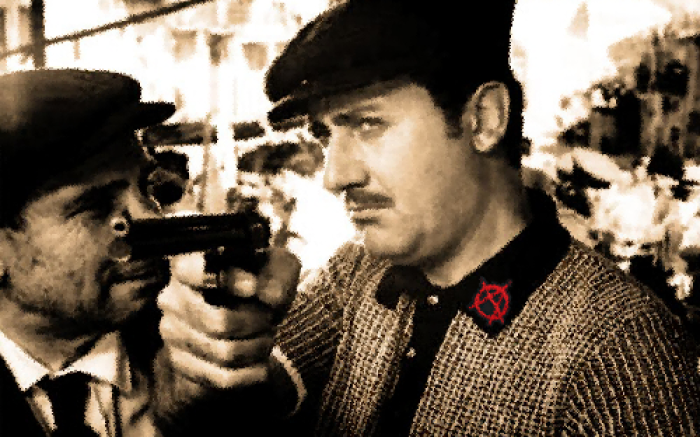These days, Italian media has been spewing a lot of nonsense and wantonly inaccurate information about anarchism. One in particular left us in amazement: the State denounced the existence of extremely dangerous relations between the mafia and the anarchist movement. According to them and to various police statements, a subversive-criminal cartel aimed at overthrowing established institutions is almost about to emerge. In a few lines, a Dadaist distortion of reality worthy of the Orwellian ministry of truth at its best.
In reality, it is curious that representatives of the state are precisely those who speak of relations between the mafia and the anarchist movement. At the moment, there is nothing remotely relevant that demonstrates these ties: the only contact between mafiosi and anarchists seems to have taken place in prison, a few words exchanged during yard time. Now, if mafiosi and anarchists are found together in maximum security prisons it is because the state put them there; with whom are prisoners from different backgrounds supposed to talk to during their only hour outside confinement, if not with each other? But while this is the only proof of purpoted mafia-anarchist association, there’s abundant evidence of relations and negotiations – at many levels – between the state and the mafia, and these should certainly worry public opinion.
For the sake of synthesis, we omit the almost daily judicial news concerning the structural relationships between organized crime and politics, transversal to political alignment and spread throughout the territory. However, we recall that one of the parties in the current government was co-founded by Marcello Dell' Utri, on whose criminal career there are no particular doubts (not to mention the mafioso groom employed by the former Prime Minister) and it has been ascertained that Andreotti has had relations with the mafia until 1980 – his lawyer, which by chance is also a politician from one of the governing parties, used to conveniently obfuscate dismissal for statute barred charges with innocence.
But the most glaring fact is that the State negotiated directly with the mafia, a fact recognized also during trials, at a time when the latter was carrying out – real, not presumed – terrorist bombings which caused significant bloodshed, moreover misleading and sabotaging those who tried to shed light on the matter. According to the judges, however, "the fact does not constitute a crime" as those in charge of the negotiation, the carabinieri, "acted in the interest of the state". Therefore, if we must speak of covenants with the mafia, it is in the state apparatuses that we must look. There, we will find concrete evidence as opposed to these grotesque hypotheses, which tell us nothing about anarchism but much about the human and political stature of the current servants of the state, and the workings of its structures.




